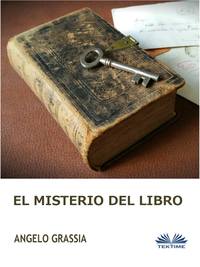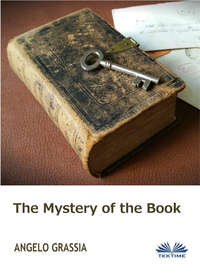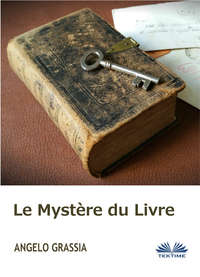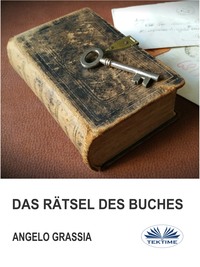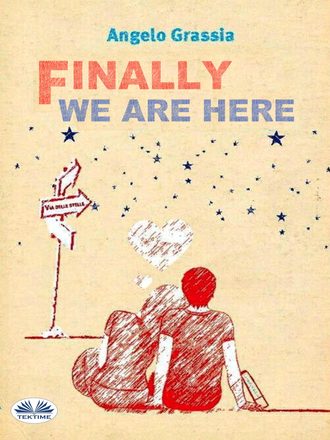
Полная версия
Finally We Are Here
I am very happy for them, but even more so because my book manages to help people with good feelings.
While I’m writing, I get the news on 11/10/2017 in Aversa a 45,000.00 Euros tern has been won playing on the wheel of Naples the numbers 7/10/78.
Well, even these numbers were inside my first book. We do not yet know who the lucky winner is, but I sincerely hope that, to be kissed by luck, he was one of my readers.
Following this series of extraordinary and inexplicable events, the only right and wise thing I could do to pay tribute to these two great men, Luigi and his son Vittorio, was to tell their lives.
I do not know why I was chosen and by whom.
But I have the certainty of having been chosen by someone or something, also because my motto is: "Rien n'est plus beaux, que l'amour"
What follows is the book Vittorio wrote and in a certain sense it has changed my life.
4
LAUDARE DIGNOS, HONESTA
ACTIO EST
SENECA .. 102
To my cousin LUIGI PALLADINO
For you, my cousin, I liked to tell the deeds; if narrations can be called the poor scraps of my inexperienced pen, I dedicate with affection and admiration this my tenuous job, begging you to excuse if unaware of "the beautiful style" I have not been able to illustrate your life as it really was, and in its depth, and in its apex.
Therefore, I beg your pardon and nevertheless I hold on the hope this homage be pleasing to you and it remains as a pledge of my sincere friendship.
Vale Stefania Palladino
Ortobello, 25 May 1906
LUIGI
Born from a wealthy family of the province, Luigi had reached the age of six always enjoying all the satisfactions the splendour can grant to children and, endowed with a sweet and serene nature, he had been filled with kisses and caresses, gifts and surprises; the sun had fallen on the child's days, always illuminating his little head.
But a sudden wind rose to dry up the harvests of wealth, of joy, of the hope of that young life, of that candid youth. Due to financial difficulties, his family began to decay, doing bad business from day to day so that, in two years, he lost all his substance, plunging into a harrowing misery. So Luigi, aged eight, the age in which children enjoy the games more and abandon themselves to the carefree joy of their green years, found himself in the most frightful misery, and he was forced to leave the toys to earn a living.
With the reflection of a man and with the will to work, he went to a coiffeur who, in exchange of his little services, thought of his existence.
From this moment on he began his hard but laborious life, painful but honest, unbearable sometimes but always loyal and reputable.
Do not believe that, having only eight years, he had not understood the full depth of his misfortune, because the smile was banished from his lips, the joy no longer shone in his clear eye and the childish brigades counted one less companion, while the despair took possession of his soul, supported only by a bright dream that came back with his fantasy of a child unaware of the world. He did not know how to set a goal, but he often repeated what he felt impressed in his soul in fiery characters: "when I will be twenty years old! .."
In this period of sorrow he also lost his father, which increased his despair, so he moved to Naples with his family, where a new series of troubles began for him and his family.
Also here he went to a coiffeur but, not being brought for this job, he entered as a garçon in a hotel. Meanwhile the years passed and his early ideas matured, acquired at the school of misfortune. He had heard of "foreign parts", where good positions could be reached with work that would have enabled a comfortable life; he inquired, he made his decisions and bold and confident in the future at fourteen he decided to leave for England.
His mother, more fearful and wary, at first denied him her permission, but he did so much, so much ... that at last, the mother satisfied him and, being far from Naples, for family reasons, she wrote him a letter where, showing him all her motherly love ... "who does not know who is not a mother ...", with loving and effective words she exhorted him and advised him on the way to go, in the harsh path of life, repeating that, in the most painful moments, re-read those characters, in which she had infused all her soul, and he would have drawn the comfort that she would send him with her thoughts every day, every hour, every moment. And in fact, how many times in the tortuous path that Fate had traced to him, the poor boy felt the need to read those phrases, so as to resume the courage he felt was missing, and use a spur to overcome all the obstacles he encountered on his journey.
How many times, rereading those characters, he wiped his bitter tears and resigned himself to his worries; how many times he kissed that piece of paper and how many times, finding himself alone among unknown and sometimes bad people, he felt the need for maternal caresses, those sweet caresses are a balm for the hardly felt human heart, and he vented on that little piece of paper the intensity of his affections.
The day of departure arrived and the intrepid Luigi, simulating the displeasure to leave the family, remained calm and prudent until the last moment, giving courage to his parents and repeating, between a hug and a handshake: "When I will be twenty years I will return, when I will be twenty years old I want to be the pride of the family. Yes ... I will be "and he left.
But when he was alone, in his third-class compartment, he gave vent to his tears and with death in his heart he said goodbye to the beautiful Parthenope, where he left his loved ones, to Italy, his beloved homeland, to the beautiful ever blue sky, to fertile countryside, to the luxuriant city, and with his head in his hands, he fell into complete abandonment, until his mind, clouded by the painful and various emotions, clouded his sight. It made him lose the notions of what had happened, it made begin a dream his past and he felt only the jerks and the dull noise of the convoy like a beating and repeating of doors, a recollection of memories and dreams, a set of leaves shook by the wind.
5
After a few days of tiring voyage, Luigi arrived in London, the city with the eternal fogs, it welcomed and adopted the poor Italian boy, but it always conserved its existence as a strict stepmother, subjecting him to the hardest trials, to the hardest fights, to the most harsh rigors and making him experience all the atrocious spasms of the exile, the humiliations of the needy, all the moral and physical pains. As soon as he arrived he was hosted by a relative of a friend of his, and the following day he showed up at an agency to look for a place to earn a living; he was offered a post of garcon in a small pension, and he willingly accepted, just to start work, since he could stay under the responsibility of a with a modest work. In the new place, he was in charge of the hardest services, the most tiring tasks, and in return very little inedible food and inhumane treatments; but he had to endure, because, beyond the need, he wanted to learn English at any cost (not knowing anything about this language, he tried to make himself understood using a bad French he had learned by himself in six months in Italy).
He endured all the hardships, though he often swallowed bitter tears.
After some time, he went to another pension, then into a bourgeois family, and even here he counted a succession of troubles; he occupied other places, always tiring and not very lucrative. Finally he found a "place" in a palace of a Milord, who had since six months a model of bride, a dear and beautiful Lady of twenty years with physical qualities and with the most noble virtues that woman can hold.
The two spouses took Louis as a close look, they took an interest in him; and soon he became their "enfant gaité" (darling).
Giorgio, as the masters called him, was their trustee, and his only mission, in that house, was to bring to the masters, on their orders, a tray with three glasses filled with champagne, one for each master and the other for him. So much was their affection for him that, in the evening, they did not retire to their rooms if their "enfant gaité" had not gone to rest before.
But, like gold, he had to be tried by fire, therefore his adverse destiny did not want to abandon him.
Now he had found a delightful oasis in the desert of his life, he had the misfortune of meeting in the "house master" a perverse man, whose bad instincts, aided by envy, flared up and changed into a relentless hatred for the poor Luigi. The wicked man always amused himself by torturing him with words and deeds, and he bitterly bit the day with his sneers, his lashings, his outrages, continually tearing his wound with the scorn of his beloved homeland "Italy".
Perhaps it was the most painful period of his life and we can easily understand it by looking at it from the psychic side. We think about the poor Luigi alone, without relatives; without friends; let us think of his heart, very much tried by the troubles, the incessant fever of nostalgia that tortured him and we imagined his sad thoughts, his melancholic days, his painful vigils.
Let's see him sad and meditative to tread the foreign soil, wander among unknown people, speak a different idiom, look at a foreign sky and we think about his patriot love magnified by distance, changing to the profound religion that painted Italy not as a beloved land, but as a Supreme Idol, infusing him with courage, giving him faith, constancy, stirring up his leaps and heroic deeds, exhorting him to noble undertakings and making him repeat the verses of Cavallotti in the Song of Songs:
"To her my prayers, I ask her the boldness. Faith, the perseverance, the magnanimous angers. I dream her in the nights, I see her in the nights.
I give her affections, tears, for her I fight and I believe. And the heart beats in turmoil and a fever conquers it, while the sweet image looks at me and smiles at me ".
And who does not love the country?
"... they also love them.
The native caverns, the same proud, " Metastasio says.
So we think about the torment of his heart, about the heart of the exile, he dreams about his country and he raises this dream to the most sublime peaks of the Ideal, he hears insults on it with atrocious and overwhelming words.
Let us think about the revolt of his whole being against the reprobate who dares to despise his most sacred possession, seeking to condemn his religion, ardently hurting his idol. And every day Luigi had to undergo this torture, every moment he felt despising his beloved homeland.
Yet, even though he was tormented by constant insults, Luigi stifled his pain and anger and he had the magnanimity to write to his mother he was pleased and happy, while some tear came to fall on the sheets of paper, as if to deny his words.
Finally the hour of the revolt sounded. One day while Luigi, the Master of the House and all the family members were at table, they were struck by the rhythm of a Neapolitan song "Oi Marì", sung in the street and accompanied by the organ of an Italian wandering player. Hearing the music of the sweet little known song, Luigi felt his heart moved, thundering, his temples beating him like hammers, the blood flowing to his head and a pile of pious memories, dear memories, happy memories coming to invade his adolescent youthful seventeen mind. But, at the same time as he was prey to these sweet emotions, the harsh voice of the Master of Home called him to the harsh reality:
"Do you hear, Giorgio, your Italians? They can do only this, miserable ones! ".
These words were the lit fuse that gave fire to the out mine since some time in the heart of Luigi, in the complete revolt of his whole being. These injuries led him to paroxysm: he forgot himself, angry like a beast who defends his offspring, he would have jumped around the neck of the Master of Home if he was close to him, but as he sat opposite him, he grabbed a glass and he threw it to his face with a mad laugh and a cry of rage like a roar.
Then there was an indescribable scuffle; all the servants became pale, astonished: the Master of the House with a wound in the forehead from which flowed a trickle of blood lost in the thick eyebrows, with eyes inflamed by hatred, with the mouth half open covered by a reddish foam, he wanted to throw himself on Luigi, who, fearless with his arms folded, was waiting with defiance of the brute's fury! But luck would have it that the Milord moved from an adjoining room and, hearing that devil, he rushed to the place where the drama unfolded and he was amazed by the gruesome picture offered to his eyes. He wanted to be informed of everything and, with his authority, he tried to calm those troubled souls from the incident; in fact, little by little the calm was restored, the Master of the House had the care he needed, Luigi retired to his room and soon the palace returned to its normal state. On the second day the Milord discharged from his service the Master of the House with the order to leave the palace immediately.
In the meantime Luigi had already regretted his excess of anger and for how much he recognized his anger was legitimate, in his good heart, he felt a hint of remorse and who knows what he would have given to make appear everything a painful dream. He reproached for letting himself be carried away by rage and he would have gladly made the time retreat, to stop that rage. He did not think, in his adolescent mind, human affairs are the work of Fate, a powerful God who governs the destinies of men and an arbiter he rises among them working, destroying, sometimes denying, but often as Filicaia in "Providence" : "Or he pretends denying or he grants in denial".
Fate had wanted that event, because Luigi's life had a change. In fact he (always stimulated by the unknown force of fate) ardently desired to change "place" because those places, reminding him of the tragedy of which he was the protagonist, made him experience continuous emotions, aroused him sad thoughts and everything that surrounded him appeared dismal and creepy; so he decided to find another place at any cost.
He had a sincere friend who occupied a good position: he confided in him and he had from him the promise of making him find a good seat soon.
After a few days, Luigi was satisfied; through his friend he had a "place" in a Hotel, that is, in a company of those who make the season in the best Hotels in Europe and abroad.
That new place made him very happy because, in addition to job satisfaction, it was a lucrative place and he had the prospect of a beautiful future; moreover, his good character, or rather his moral qualities, captivated all the souls of his superiors and colleagues and soon he saw himself surrounded by the affection of all. He worked assiduously and during the hours of rest he also tried to study and, finally, after a few months, having vacated a position as second secretary, the director considered it well to admit Luigi, being himself the most suitable to occupy that place quite important. His joy was Indescribable, seeing himself reach the base of his ascent, prefixed and long coveted, seeing start the realization of his desires that aroused new and stronger hopes to get a day a reward to the many moral and material endeavours endured .
But the hard trials were not ended for him: the company, after the season in London, sailed for Algeria. The journey was very beautiful, the long expanse of the sea reflected, like a mirror, the pure blue of the sky, the ship was running fast on the waves cut by the helix and then joined in a long foamy furrow. Nature was in perfect calm and all the crewmen were smiling at the ocean, in the sky, in the sun ....
But there is no rose without a thorn; the crossing, at first happy, changed into great danger, into an indescribable fright. They entered the Strait of Gibraltar when great clouds appeared on the horizon, which, driven by a sudden, impetuous wind, run and succeeded each other with dizzying rapidity, gradually covering the sky. Strong bursts elevated the waves banging against the sides of the ship, the cabins, the trees.
The captain, an old sea dog, was not disturbed by the change of weather, but when the vigorous blows of the sea began to damage the ship and the lightning came to illuminate that terrible spectacle, he understood the danger and although he tried to appear calm in his concise orders, a visible disturbance upset his hard features of an expert sailor.
The fright and the panic of the crew cannot be imagined: someone prayed, someone wept, someone desperate, all implored the help of Providence.
Luigi, attached to the mast, contemplated the hellish ridden of the shocked elements, while invaded by a great sadness, he thought about all his past life and the memories evoked in his mind one by one, recalling his painful childhood and sad adolescence. He saw every day of his gray days, all the troubled nights, and he thought about him again and again when he felt alone, abandoned by everyone, imploring a smile, a caress, a dear word, and he had to suffocate his full affections, showing an indifferent face to those around him. Now he could almost sing victory, he saw himself at the mercy of those angry waves, whose frightful depths opened from time to time, showing they had swallowed the fragile ship in the midst of that stormy ocean.
The struggle between life and death was terrible. From each one the irreparable loss was savoured and everyone felt a harrowing agony. A more impetuous stroke of the sea truncated the mast, after a few moments Luigi had abandoned it to return to the cabin; certainly Providence watched over him. The captain saw himself lost, but in the most desolate moment, when all the minds in Heaven had forgotten the earthly goods and waited for their fate, Neptune appeared with his trident and he ordered the storm to calm down. In fact, little by little the storm ceased, the clouds thinned out and a light breeze, moving more and more the clouds, puffed the sails, rippling the surface of the sea became quiet.
Hope shone in everyone's eyes, the captain improvised repairs to the ship and with the help of the Divine Hand, after a few hours, they entered a nearby port. The second day they continued the journey and finally they landed at the coasts of Africa.
So Luigi becomes a guest of Algiers and he begins his laborious but peaceful life, radiated by a bright star he believes to see in his path, the star points him to the right path to lead him to the goal.
Meanwhile time passes and from Algeria he returns to England, then to France, then to Belgium, Austria, Germany, always counting numberless adventures; finally, at the age of twenty, satisfied, enlightened by a life full of smiles, he thinks the time has come to see his beloved mother, his relatives, his childhood friends and the dear shores of his country.
Luck, this time, accompanies him: for his Company he has to do the season in a large hotel in Rome. This is how, after seven years, Luigi returns to his homeland and enthusiastically he sees the exquisite peaks, the pleasant lakes, the playful valleys, the colourful gardens. Beautiful, bold, animated by new hopes he flies in the arms of his expectant mother awaiting for him.
Moving is the scene inside the familiar walls, cheered by the arrival of the wandering exile for so many years that, as a child and abandoned to himself, could get dirty in the mud and instead he returned an honest man, whole, industrious with the moral embellished by encyclopaedic knowledge he learned in his travels and adventures, strong by the four languages he knows, he speaks with ease and elegance, always in a deferential way and without presumption.
He revisits his native village, Orbetello, and he feels happy to tread the soil, of which every atom awakens him a "souvenir", a sweet remembrance, a dear memory and moved by so many resurrections he swears on the ashes of his ancestors and on the images of the protective deities, to do always excellent work, to regain his rank, which tore him a cruel destiny and to make his beloved land palpitate with pride.
Then he leaves to continue his life, happy to feel now in port, confident to reach one day the desired goal.
Now it is the time of the modest storyteller to send to the protagonist of this simple story, the genuine narration of his cases and his adventures, his most fervent wish: "a smooth path, surrounded by joys, consolations, illuminated by hope, infused by happiness, where a guardian angel leads him shortly to the goal, filling him with all the satisfactions he deserves for his elevated feelings, for his generous heart, for his iron will for action, for all his misfortunes, for all his moral and material penalties, for all his sacrifices, for all that concerns his life, which is nothing but a succession of troubles fought and won with resignation, self-denial, honesty and the job."
STEFANIA PALLADINO
Orbetello, 25 May 1906
6
Stefania Palladino, a well-known writer of the time in which she lived, had begun, perhaps involuntarily, to tell the pathetic and adventurous life of her cousin Luigi.
I do not know the motive has induced her to do so: did she do it for the kinship between them, for a lively sympathy towards the cousin or for the interest aroused by chance?
I elevate, however, an affectionate and devoted thought to her memory and I thank her, not only for the accomplished human gesture, but also for the way she has always presented the figure of my Father, putting particular emphasis on the qualities and exalting the feelings.
I, the eldest son of Luigi Palladino, on the threshold now of seventy-seven, having, throughout this period, known men and things, I believe my parent is:
"AN HOMME MEMORABLE".
So I continue the story of Stefania Palladino, invoking the benevolence of all those who will read the whole affair if, with the help of God, I will be able to complete it and I ask their forgiveness if they should notice in my work a gesture of presumption.
7
When my father came back from England, with the savings he had accumulated, not so much for the lavish earnings but for the imputed deprivations, the first thing he did was to give to his mother a dignified arrangement. During her son's stay abroad, she had lent her work as a governor to a noble Neapolitan family.
From what they told in my adolescence and what I remember, one day my father, turning to his mother, told her: "Mum I gave you a gift: I bought the fabric for a dress; I want to see you even more beautiful than what appears in my eyes. I also know a good dressmaker and I am sure she will satisfy you; in a few days, when you want, we'll go with her for the pack. "
The mother, already by nature emotional and perhaps remembering some circumstances not happy of the past, embraced his son with so much effusion, whispering these words: "Look a bit what my son have done for me!"
And the day came when my father took her to the seamstress. This, by the name of Virginia, gave them a warm welcome and, having arranged them, immediately took care to show the models that, more than others, suited her. Her suggestion was widely shared and appreciated.
On the street, then, they commented about the meeting and Donna Anna, so it was called my grandmother, said to her son:
"I'm really satisfied. That dress is beautiful and kind and I think she does very well her job. How did you meet her? "
My father, a little surprised by this question, with a rather mischievous smile, answered:
"She is the sister of a friend of mine, mother; to tell you the truth, however, Virginia is not a professional dressmaker but she has learned the art of cutting and sewing at the French nuns she attends in the hours of freedom and leisure. When I told her about you and I told her about the gift I wanted to give you, she encouraged me so much, to the point of telling me she would accompany me for the choice and purchase of the fabric. And so it was: together we did the shopping ".


